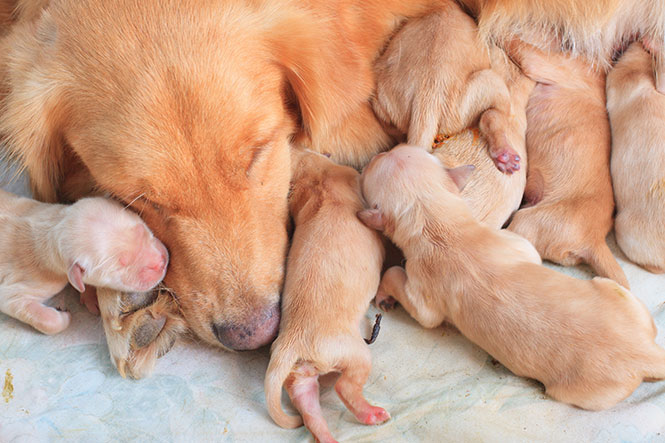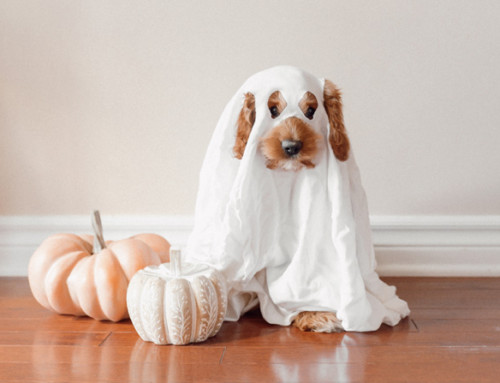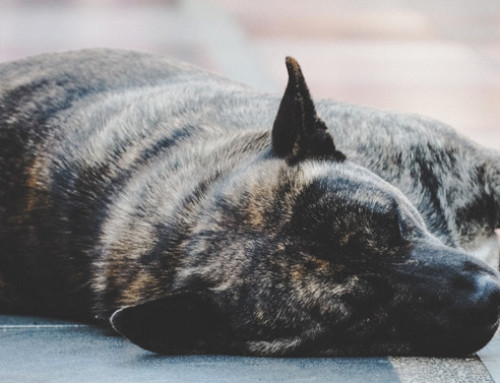As exciting as it is to have a new puppy come into your life, the work and care they require is extensive and constant. You need to ensure that you can properly care for your new puppy before you bring them into your life – you cannot rely on the puppy’s mother to do all the work! To help you out with your new pup, this is a general guide on how to care for newborn puppies, including what warning signs you should look out for.
Two weeks before birth
- Choose a comfortable space to set up a whelping box with four sides and a strong bottom. The box needs to be spacious enough for the mother to lie down and stretch out, and for the puppies to have enough room without being crowded or squashed. You can accustom the mother to the box by placing her favourite treats inside and rewarding her whenever she enters
- It’s important that the sides of the box are tall enough to keep the puppies in, and short enough so that the mother can comfortably jump over
- Line the floor of the box with plenty of newspaper or towels as you’ll be changing out the lining often
- Keep water and food close by for the mother, so she can feel more at ease near her puppies when eating and drinking.
Giving birth
- Don’t worry if the mother chooses to not give birth in the box. As long as it is safe, let her pick her spot. If you try to move her, she may become stressed, prolonging labour
- No visitors! Keep distractions like TV, bright lights, and loud noises to a minimum
- Keep quiet and calm. The mother needs to concentrate, and your stress will only add to her stress.
After birth
- Leave the placenta on the puppy. Don’t cut it as this could cause haemorrhaging. It will dry up on its own
- Change the lining when the mother is out taking a break
- For the first couple of days after birth, leave the puppies alone as much as possible so they can bond with their mother
- Adjust the room temperature, as newborn puppies are unable to regulate their own body temperature. A puppy that is too cold will feel cool and may be unresponsive. An overheated puppy will have a red tongue and red ears
- Place a heat mat on a low setting under the lining to keep the puppies warm. A heat mat is preferable to a heat lamp, which can dry out a puppy’s sensitive skin. A hot water bottle wrapped in a towel also does well
- Newborn puppies are deaf and blind, so they may need help in learning to nurse. Place the puppy against the teat and gently guide his head until he finds it
- Healthy puppies gain about 10-15% of their birth weight daily, so be sure to monitor them regularly.
Care for orphaned pups
- Hand rearing a newborn puppy requires 24 hour attention for at least the first two weeks of their life
- Consult a vet on which milk substitute is best to use. Milk supplements can be found at clinics and pet stores. Do not use milk from cows, goats, or infant formulas
- Temporary emergency milk can be made from four parts evaporated canned milk and one part boiled water. Specialty feeding bottles need to be used, but an eyedropper will do in an emergency
- The puppies need to be fed every two hours, or about twelve times in a 24 hour period. Hungry puppies will wriggle and cry. Full puppies will have nice round bellies. Let the puppy eat until they stop – they should then fall asleep until their next meal
- Wipe the puppy’s bottom before and after each meal. New puppies cannot yet urinate or defecate on their own and need to be stimulated
- At about three weeks, you can start spacing the feeding times to every four hours
Six weeks after birth is the recommended time for your puppy’s first vet visit. There are, however, some signs that your puppy may need to be taken to the vet earlier. These warning signs you should look out for include:
- Poor weight gain
- Lack of appetite
- Pale gums
- Diarrhea
- Eye discharge
- Nasal discharge
- Difficulty breathing
There are, of course, other causes for concern in a newborn puppy’s life, so if you notice your pup exhibiting any worrying behaviour – take them to the vet. Hopefully, however, your pups will blossom well and go on to have long, active lives with their new owner – you!
What do I need to know before buying a puppy?“There are several questions you should ask yourself before bringing home a new little bundle of joy. These include the environment your puppy will be in and whether it’s puppy-friendly and safe – is it fenced, warm, and are there other pets in your family to be considered? Another question is do you have the time to provide all the care and attention your puppy will need?” |
Learn more about the benefits of dog insurance for your puppy here.







Leave A Comment